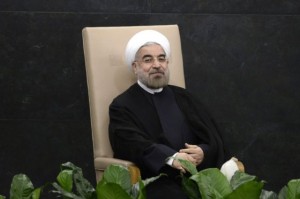 Iranian President Hassan Rouhani faces a tough sell as he presents his nation’s economic prospects before business leaders this week in Davos, Switzerland, a Bloomberg Global Poll suggests.
Iranian President Hassan Rouhani faces a tough sell as he presents his nation’s economic prospects before business leaders this week in Davos, Switzerland, a Bloomberg Global Poll suggests.
Asked whether Iran will be a viable investment opportunity within the next five years, 29 percent of survey respondents answered yes, while 57 percent said it wouldn’t. Fourteen percent said they had no idea. Those questioned outside the U.S. were more likely to be optimistic.
The poll was carried out Jan. 16-17, before yesterday’s news that the Islamic Republic had frozen the most sensitive part of its nuclear program, in accordance with a deal reached with world powers in November. Some of the U.S. and European Union sanctions and capital controls imposed on Iran because of its atomic work will be lifted, opening the door for international companies to enter the country of about 77 million people.
Rouhani, the first Iranian leader in a decade to visit the Swiss ski resort for the World Economic Forum, will be looking for deals to boost an economy that shrank more than 5 percent in the last fiscal year through March under the weight of sanctions.
He’s due to address the forum on Jan. 23 during a session called “Iran in the World.”
Iran, with the world’s fourth-biggest proven oil reserves, says its nuclear program is for civilian purposes, while the U.S. and its allies accuse it of seeking to develop nuclear-weapons capability.
Election Pledge
Rouhani took office in August after winning election on a pledge to end the country’s global isolation under his predecessor, Mahmoud Ahmadinejad. During his first 100 days, he broke taboos by speaking on the phone with his U.S. counterpart Barack Obama, as well as reaching the Geneva accord on Nov. 24.
U.S. officials have said the sanctions relief available to Iran under the agreement could be worth as much as $7 billion.
“Over the coming six months, proper implementation of the agreed measures will be key,” EU foreign policy chief Catherine Ashton said yesterday in a statement. “More work will be needed to fully address the international community’s concerns regarding the exclusively peaceful nature of the Iranian nuclear program.”
Restrictions on precious metals, petrochemicals and shipping insurance as well as airplane and auto parts will be lifted immediately, the EU said yesterday in a statement. Iran will receive the first payment on $4.2 billion in previously blocked funds on Feb. 1, when it gets a $550 million installment, the White House said last week.
Rouhani is being accompanied to Davos by his foreign minister, Mohammad Javad Zarif, who negotiated the Geneva accord, the first major crack in the deadlock over Iran’s nuclear programsince 2003.
The poll of 477 investors, analysts and traders who are Bloomberg subscribers was conducted by Selzer & Co., a Des Moines, Iowa-based firm. It has a margin of error of plus or minus 4.5 percentage points.
By Bloomberg
The Iran Project is not responsible for the content of quoted articles.

 QR code
QR code